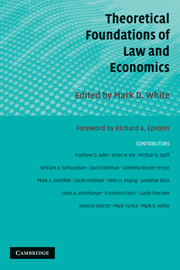Book contents
- Frontmatter
- Contents
- Foreword
- Preface
- Notes on Contributors
- PART ONE THE ROLE AND USE OF ECONOMICS IN LEGAL STUDIES
- 1 Modeling Courts
- 2 Is There a Method to the Madness? Why Creative and Counterintuitive Proposals Are Counterproductive
- 3 Functional Law and Economics
- 4 Legal Fictionalism and the Economics of Normativity
- PART TWO EFFICIENCY
- PART THREE RATIONALITY AND THE LAW
- PART FOUR VALUES AND ETHICS IN CIVIL AND CRIMINAL LAW
- Index
- References
4 - Legal Fictionalism and the Economics of Normativity
Published online by Cambridge University Press: 06 July 2009
- Frontmatter
- Contents
- Foreword
- Preface
- Notes on Contributors
- PART ONE THE ROLE AND USE OF ECONOMICS IN LEGAL STUDIES
- 1 Modeling Courts
- 2 Is There a Method to the Madness? Why Creative and Counterintuitive Proposals Are Counterproductive
- 3 Functional Law and Economics
- 4 Legal Fictionalism and the Economics of Normativity
- PART TWO EFFICIENCY
- PART THREE RATIONALITY AND THE LAW
- PART FOUR VALUES AND ETHICS IN CIVIL AND CRIMINAL LAW
- Index
- References
Summary
It is a classic tenet of jurisprudence that there is a deep difference between legal directives and the commands of a band of robbers. For instance, Cicero declared: “What of the fact that many harmful and pernicious measures are passed in human communities – measures which come no closer to the name of laws than if a gang of criminals agreed to make some rules?” And Augustine said: “Justice being taken away, then, what are kingdoms but great robberies? For what are robberies themselves, but little kingdoms? The band itself is made up of men; it is ruled by the authority of a prince; it is knit together by the pact of the confederacy; the booty is divided by the law agreed on.” Ever since Cicero and Augustine resorted to justice to mark law off from other coercive practices, natural lawyers have availed themselves of various normative notions for interpreting governmental coercion as lawful.
Law is essentially associated with the idea of normativity. Though there are different conceptions of legal normativity, most of them pertain to two kinds: justified normativity and social normativity. Natural lawyers, such as Cicero, Augustine, and Aquinas, defended justified normativity. On this view agents must rationally accept legal norms or standards that derive from absolute moral principles and act in accordance with them. Normative practices therefore rely on true moral beliefs. In contrast, H. L. A.
- Type
- Chapter
- Information
- Theoretical Foundations of Law and Economics , pp. 55 - 76Publisher: Cambridge University PressPrint publication year: 2008



